Bangladesh Bank Deputy Governor Md. Habibur Rahman said that the recent move to make the exchange rate market-based aims to signal the country’s reform intentions to the international community.
However, if the dollar rate increases beyond acceptable levels, the central bank will intervene.
Speaking on Thursday at a policy event titled "Monthly Macroeconomic Insights (MMI)" in Banani, Dhaka, organized by the Policy Research Institute (PRI), he emphasized that the initiative is part of Bangladesh Bank’s broader reform agenda.
Habibur Rahman noted that although the official letter has not yet been issued, the government has given the green light.
The market-based exchange rate is expected to yield positive outcomes and reflect the country’s commitment to economic reform.
It also demonstrates that Bangladesh’s external sector remains strong.
He observed that following the exchange rate shift, the taka showed some fluctuations on Wednesday but did not significantly depreciate.
Over the next few days, the central bank will monitor the situation closely. If necessary, Bangladesh Bank will step in, as it has the tools to stabilize the market.
The event was attended by key figures, including Anisuzzaman Chowdhury, Special Assistant to the Chief Adviser of the Ministry of Finance, who served as the chief guest. PRI Chairman Zaidi Sattar presided over the session.
In the keynote presentation, Dr. Ashikur Rahman, Chief Economist at PRI, said while the economy is showing signs of recovery—largely driven by exports and remittances—fiscal and monetary weaknesses remain.
He highlighted that separating revenue policy from administration and moving to a market-based exchange rate are two significant reform measures.
He expressed optimism that these reforms will help address Bangladesh’s low tax-to-GDP ratio and contribute to stronger economic recovery in the medium term.
Australian High Commission representatives Clinton Pobke and Joshua Gasutan also attended the event as special guests.











-20260305071113.webp)



-20260304091720.webp)






-20260303080739.webp)














-20260228064648.jpg)
